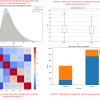Latest Posts |
|---|
|
From Our Partners |
|---|
More Recent Posts
- 5 Free Courses to Master Math for Data Science
- 7 Steps to Mastering Data Engineering
- Popular Google Certification for All Areas in the Tech Industry
- 7 Things Students Are Missing in a Data Science Resume
- 5 Free Resources to Master Your Data Science Job Search
- The Ultimate Roadmap to Becoming Specialised in The Tech Industry
- Exploring the OpenAI API with Python
- 10 GitHub Repositories to Master Python









